#b2c market research
Text
Difference between B2B and B2C Market Research
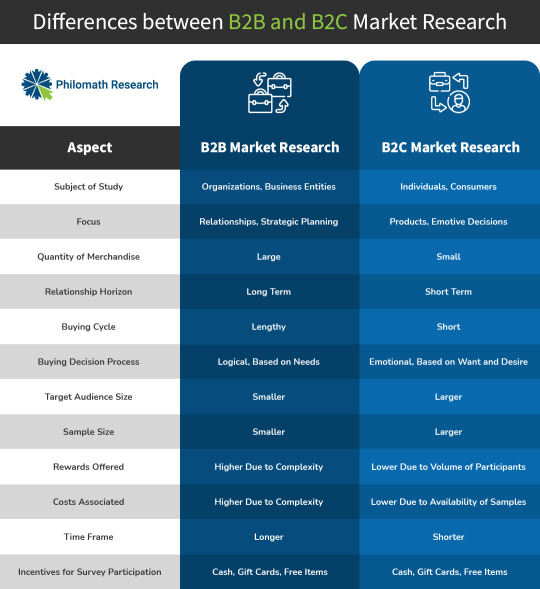
0 notes
Text
Consumer Market Research
Our B2B panelists tend to be incentivized significantly more than their consumer market research counterparts. If such respondents do get past recruitment checks conducted by the panel company, they could easily dilute the panel’s integrity.
0 notes
Text
B2C Research Panels in Delhi | Snware Research
Calling all trendsetters and savvy shoppers! Dive into the world of consumer insights with our dynamic B2C research panels! Discover what makes your target audience tick, stay ahead of shifting preferences, and unlock the secrets to driving customer satisfaction. Join us on this exciting journey and take your business to new heights of success!
0 notes
Text
Cheap Lead Generation
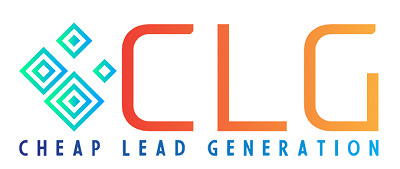
Cheap Lead Generation: Your partner in affordable, high-quality B2B lead generation and market intelligence,
we fuel your business growth and innovation.
Web Research and Market Research,
Lead Generation Lead
Market Analysis,
Lead Generation Specialist
B2C Lead Generation,
Lead Generation Experts
#Web Research and Market Research#Lead Generation Lead#Market Analysis#Lead Generation Specialist#B2C Lead Generation#Lead Generation Experts
1 note
·
View note
Text
Difference Between B2B and B2C
If you are involved in marketing, you have probably heard about B2B and B2C marketing. Even though they have very similar goals and share some similarities, there are also important differences between the two. Understanding these differences can help you make more informed decisions when it comes to marketing your brand or product.
First of all, the basic concept behind B2B and B2C is very different. While B2C focuses on appealing to individual customers, B2B focuses on selling products and services to other businesses. This means that when it comes to marketing, the target audience is completely different.
Furthermore, the buying process for both businesses is also different. While consumers tend to buy items on impulse or based on emotion, businesses are more likely to make purchase decisions based on logic and data-driven decision-making processes.
In this article, we will take a closer look at the key differences between B2B and B2C marketing so that you can determine which approach would be best for your organization’s needs.
What is B2B and B2C?
B2B stands for business-to-business. It refers to a type of transaction where one company sells products or services to another company in order to help them make money. Examples of B2B transactions include manufacturers selling to wholesalers, as well as software companies selling their products to other businesses.
On the other hand, B2C stands for business-to-consumer. As its name implies, it’s when a business directly sells products or services to consumers rather than other businesses. Examples of B2C transactions include stores that sell clothing and online retailers that offer food delivery services.
Therefore, one way to think about the difference between B2B and B2C is that B2B involves companies selling to each other while B2C involves companies selling directly to regular consumers.
Comparing the Strategies of B2B and B2C Marketing
When you compare the strategies of B2B and B2C marketing, the differences become apparent. B2B marketing is far more complicated than B2C marketing because it involves longer buying cycles and larger purchase quantities.
In most cases, decisions to purchase products or services for a business involve multiple stakeholders, and each stakeholder has their own questions and objectives that need to be addressed in the decision-making process. Because of this, it is necessary for B2B marketers to have a deeper understanding of their target audience—their needs, pain points and goals—in order to create relevant content that will resonate with them.
Additionally, there is usually much higher value associated with a B2B sale than with a B2C sale. This can often lead to long sales cycles with multiple touchpoints throughout the process and the potential for ongoing customer relationship management over time. As such, B2B marketers must have a strong understanding of their customers’ businesses and complex decision-making processes in order to be successful.
Key Differences in Customer Profiles and Journey
When it comes to customer profiles and the journey they take to purchase, B2B and B2C marketing each has distinctly different approaches.
Customer Profiles:
Business-to-business (B2B) marketing requires understanding a complex network of decision-makers – from the CEO or board down to the person inspired to make a purchase. On the other hand, B2C focuses on individual customers, targeting their interests and preferences in order to draw them in.
Customer Journey:
The customer journey for B2B is often much longer than for B2C. Since businesses will be investing larger sums of money into a product or service, they’ll need more information to make an informed decision. This means business purchasers take time looking through various details such as pricing, specifications, and quality assurance before making their choice – often months after first being exposed to the product. B2C customers are typically driven by emotion, desire and impulse rather than rational thought processes, meaning their buying decisions can occur more quickly after first exposure.
Targeting Techniques for Each Type of Marketing
Understanding the differences between B2B and B2C marketing will help you to target each type effectively. The way you target your customers will depend on who you are marketing to.
When it comes to B2B marketing, there are several different targeting techniques that businesses can use to reach their audience. Some of these techniques include:
Using industry publications or trade shows to reach potential customers
Networking with other industry professionals and connecting with them on social media
Crafting targeted digital campaigns using keywords related to your industry
On the other hand, when it comes to B2C marketing, businesses typically employ strategies like:
Creating targeted ads based on consumer demographic information such as age, gender, or location
Using influencers or celebrities to create an emotional connection with potential customers
Leveraging social media platforms such as Instagram and YouTube for their marketing efforts
By understanding the differences between B2B and B2C targeting techniques, you can tailor your campaigns for each audience and ensure maximum success.
Benefits of a Combined Approach to Marketing
When it comes to marketing, there are many advantages to using both B2B and B2C approaches. Such a combined approach offers businesses the opportunity to reach potential customers from two different perspectives, resulting in increased brand visibility and recognition.
Reach more customers
By utilizing a combination of both B2B and B2C marketing, businesses are able to reach more potential customers than either would on its own. By targeting specific audiences with tailored messaging, companies can create a larger customer base.
Increased awareness
A combined approach also helps to raise the profile of a brand by creating greater brand recognition with consumers. By creating targeted campaigns that speak directly to the interests of both consumers and business buyers, companies can build trust among their target audience while simultaneously creating new contacts.
Unique insights
Moreover, a combined approach gives businesses access to unique insights from both customer segments, which can help inform future marketing efforts. By gathering data from both consumer and business buyers, businesses can better understand their target market, enabling them to create more effective campaigns in the future.
Adapting to the Times: The Importance of Market Research
The success of your B2B or B2C marketing strategy largely depends on how well you have studied the market. With the ever-changing trends of consumer behaviour, adapting and evolving is essential for staying ahead of the competition.
Market research helps to identify potential opportunities and threats, as well as new markets you plan to enter. Through this process, you can determine who the target customers are and what their needs are. By knowing these key information points, you can significantly increase your chances of success.
It is also important to stay up-to-date with industry news, trends and technologies so that you can make informed decisions on how best to promote your products or services. Keeping track of competitors in your space will also help you create a better marketing strategy for your business.
Finally, test out different strategies before investing in them – this will give you a better insight into how effective they are. Be sure to continuously review and refine each strategy based on data collected from market research, competitor analysis and performance metrics such as reach, engagement and conversion rates.
Conclusion
In conclusion, B2B and B2C have distinct differences that should be taken into consideration when marketing products or services. If your business strategy requires the pursuit of either B2B or B2C, understanding the different marketing activities, sales cycles, and core customer needs will set you up for success.
Market research is essential when exploring the B2B or B2C landscape, as it provides deeper insights into customer behaviour and market trends. By getting to know your target audience and prioritizing strategies that address their wants and needs, you can create effective strategies for your B2B or B2C business.
Know More About B2B Marketing Strategies:-
#b2b market research companies#b2b marketing#b2b vs b2c#b2c marketing#difference between b2b and b2c
0 notes
Text
Google and Amazon stand to gain from Meta’s social commerce exit
Ever since the pandemic outbreak, the e-commerce industry landscape has undergone a major revamp, with social commerce emerging as the next growth driver for the global market. Players such as Meta, Google, and Amazon all made a major push in the segment to tap into the high-growth potential of the social commerce industry. According to PayNXT360 estimates, the global social commerce market is expected to grow at a compound annual growth rate of 12.7% from 2022 to 2028. The global social commerce GMV will increase from US$661 billion in 2023 to reach US$1.3 trillion by 2028.
#Gift card market size#B2C Ecommerce Industry size#gift card trend#BNPL market size#gift card research report#Asia pacific Social Commerce market#Growth of B2C Ecommerce Market#B2C Ecommerce Market Analysis#gift card market research#Industry Outlook Of B2C Ecommerce Market#Prepaid card market share#U.S. prepaid card market#Prepaid card market research#Digital Remittance Industry size#Market Research Report Embedded finance#Social Commerce trend & Analysis#Industry outlook on Embedded Finance#gift card innovation#Embedded finance Industry size#Global Prepaid card market size#Industry outlook on BNPL#Prepaid card report#Report on Embedded Finance
0 notes
Text
Quick commerce businesses have taken a hit due to the fall in lockdown-driven demand in Europe

The quick commerce business gained rapid ground during the global pandemic outbreak in Europe, as it did in other parts of the world. However, after the rapid expansion, the sector has taken a hit due to the fall in lockdown-driven demand for deliveries. Factors including ease in lockdown restrictions and a higher interest rate environment have severely impacted the segment growth. With inflation at multi-year highs across several European nations, consumers have reduced their discretionary spending, which has affected the delivery volumes for quick commerce businesses.
Click here to read more - https://www.paynxt360.com/view-point/quick-commerce-businesses-have-tak/695
0 notes
Text
Data-Driven Strategies to Generate High-Quality B2B Leads
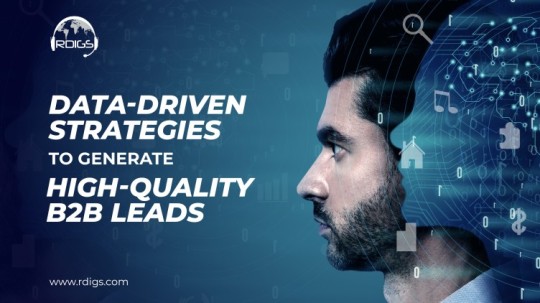
Data-driven strategies have evolved to become an absolute necessity for companies who want to create high-quality B2B leads. You need to embrace the power of B2B data to make informed decisions and tailor your approach if you want to generate high-quality B2B leads. B2B Data can help you do both. Although traditional methods of lead generation are still applicable, using them alone is not enough to maintain a competitive advantage in today's market. This is where data-driven strategies come into play.
Introduction
Since the importance of B2B data continues to rise in the modern economy. It is crucial to acquire the expertise required to harness its potential. Businesses can generate more qualified leads, improve the efficiency of their lead-generation processes, and make more well-informed decisions about their marketing initiatives all by implementing data-driven strategies. These tactics not only assist organizations in determining the appropriate audience for their messaging but also provide them the ability to customize it so that it resonates with prospective customers.
If your data can position you in the thoughts of your target audience (customers and prospects), then the work is well worth it. Else, it is nothing more than a collection of numbers that will be compiled into statistics. The challenge now is what data-driven strategies you can implement to produce more high-quality B2B leads.
In the Blog, we will discuss five key data-driven strategies that can revolutionize your B2B lead generation struggles with a focus on providing in-depth information and actionable insights to elevate your lead generation measures.
Let's quickly understand first the "Value of Data-Driven Approach In B2B Industry"
The significance of a data-driven strategy in the B2B industry resides in its ability to offer businesses important insights about their operations, customers, and market. Insights that are powered by data may provide B2B organizations with assistance in making informed choices, such as locating new business possibilities or improving the efficiency of their supply chain. This can result in higher productivity, decreased expenses, and increased profits.
Data-driven methods may assist B2B organizations in automating and streamlining their processes, therefore decreasing manual work and freeing up resources for more strategic endeavors. Data-driven lead generation gives businesses the ability to qualify leads via the use of data and analytics, therefore assisting them in identifying which prospective clients are most likely to become paying customers. This produces higher-quality leads, which is favorable for both the lead-generating company and its clients.
Identify your target audience through data segmentation
Understanding your target demographic is the first step in producing high-quality leads for your B2B sales. You will be able to find important demographics, sectors, and other criteria that make up your perfect prospect by evaluating the data you already have on your existing customers. This data allows you to segment your target audience into smaller, more manageable subgroups depending on their individual qualities. Because of this tailored strategy, you will be able to generate a unique message that will resonate with each category, which will ultimately result in increased engagement and conversion rates.
Actionable steps:
Collect and analyze data on your existing customers, such as demographics, industries, job titles, and company sizes.
Identify common patterns and characteristics among your best customers.
Segment your target audience based on these shared characteristics.
Create tailored messaging and marketing campaigns for each segment.
Leverage intent data
Intent data is information about a prospect's online behaviour, such as search queries, content consumption, and website visits. By analyzing this data, you can gain insights into their interests, pain points, and purchase intentions. Armed with this knowledge, you can tailor your marketing campaigns to address the specific needs of these prospects, making your outreach more relevant and effective. This targeted approach ensures that you engage with prospects who are genuinely interested in your product or service, ultimately leading to higher-quality leads.
Actionable steps:
Obtain intent data from third-party providers or track prospect behaviour on your website using marketing automation tools.
Analyze the intent data to understand your prospects' interests, pain points, and purchase intentions.
Create targeted marketing campaigns that address the specific needs and interests of your prospects.
Implement predictive lead scoring
Predictive lead scoring is a data-driven approach to ranking leads based on their likelihood to convert. By analysing historical data and incorporating various data points such as demographics, firmographics, and behavioural data, you can create a predictive model that assigns a score to each lead. Higher scores indicate a greater likelihood of conversion, allowing your sales team to prioritize their efforts on the most promising prospects. This data-driven approach increases efficiency and ensures a higher rate of conversion for your B2B leads.
Actionable steps:
Analyze historical data on successful conversions to identify patterns and trends.
Gather relevant data points, such as demographic, firmographic, and behavioral data, for each lead.
Develop a predictive model to assign a lead score based on these data points.
Train your sales team to prioritize leads with higher scores, maximizing the chances of conversion.
Optimize content marketing with data insights
Content marketing is a powerful tool for attracting and nurturing B2B leads. By analyzing the performance of your content, you can identify which topics, formats, and channels resonate most with your target audience. Use these insights to create data-driven content strategies that focus on high-performing topics and formats, while also experimenting with new ideas to keep your audience engaged. By consistently delivering valuable and relevant content, you can build trust and credibility with your prospects, ultimately leading to higher-quality leads.
Actionable steps:
Use analytics tools to track the performance of your content (e.g., page views, time spent, shares, conversions).
Identify high-performing topics, formats, and channels.
Create a content strategy that focuses on these high-performing areas while also testing new ideas.
Continuously monitor the performance of your content and adjust your strategy accordingly.
Utilize account-based marketing (ABM)
Account-based marketing is a targeted approach to B2B lead generation that focuses on specific high-value accounts. By leveraging data and analytics, you can identify the key decision-makers within these accounts and develop personalized marketing campaigns that address their unique needs and challenges. By concentrating your efforts on a select group of high-potential accounts, you can generate higher-quality leads and increase your chances of converting them into customers.
Actionable steps:
Identify high-value accounts that have the potential to deliver significant revenue and align with your product or service offerings.
Research these accounts to understand their needs, challenges, and key decision-makers.
Develop personalized marketing campaigns targeting the specific needs and pain points of each account.
Collaborate closely with your sales team to ensure a seamless transition from marketing engagement to sales outreach.
Wrapping Up!
The key to generating high-quality B2B leads lies in utilizing data-driven strategies that allow you to effectively target and engage with the right prospects. By leveraging data segmentation, intent data, predictive lead scoring, content marketing insights, and account-based marketing, you can create a powerful and targeted approach to your lead generation efforts. This not only ensures that your marketing and sales teams are focusing on the most promising prospects but also maximizes the return on your investment in lead generation activities.
Incorporating data-driven strategies into your B2B lead generation process may seem challenging at first, but the benefits far outweigh the initial effort. As you begin to see improved engagement, higher conversion rates, and ultimately, increased revenue growth, the value of these data-driven methods will become abundantly clear. By staying informed and adapting to the ever-evolving digital landscape, your business will be well-positioned to generate high-quality B2B leads and achieve long-term success.
To help businesses make more accurate marketing decisions, generate more effective outcomes, and craft flawless future campaigns, RD Info Global Solutions provides you with high-quality B2B lead-generation solutions. To know more drop us your queries at [email protected]
#marketing#research#leads#b2c#b2b#email#market#confirmed call back#sale#lead#top b2b lead generation companies in india#lead generation
1 note
·
View note
Text
Top Non-IT Jobs with High-Paying Salaries
In the era of technology and science, when it is very easy to find high-paying jobs, you can also aspire to a few non-IT jobs that will take you through well-paying job positions. You will have a great career in the fields of arts, humanities, and social sciences (HASS). In this article, we have put together a list of non-IT jobs you can aim for high–paying salaries.

Accounting
Accounting as a discipline is categorized under financial accounting, management accounting, tax accounting and cost accounting. Accounting as a career offers financial accounting, management accounting, auditing, Information systems, Tax accounting, Forensic accounting, and Political campaign accounting.
Potential careers with high-paying salaries in Accounting are the followings:
Bookkeeping, accounting, and auditing clerk
Accountant or auditor
Bookkeeper
Accountant
Accounting manager
Corporate Communications
Corporate communications involve managing internal and external communications development for stakeholders that are intended to develop a positive and beneficial point of view. This field includes media relations, speech writing, employee communication, corporate advertising, and community relations. Corporate communications can be divided into management communication, marketing communication, and organizational communication.
If you choose corporate communications as a career, you will have the following job options:
Communications Manager
Marketing Communications Manager
PR Manager
Media Relations Manager
Public Affairs Manager
Online Communications Manager
PR & Events Manager
PR & Communications Manager
External Affairs Manager
Communication and Marketing Manager
Corporate Affairs Manager
Internal Communications Manager
PR and Events Manager
Manager of Public Relations
Technology Communications Manager
Recruitment
Recruitment is the process of identifying, sourcing, screening, shortlisting, interviewing candidates, and onboarding candidates within an organization. Recruitment in 2022 has become an umbrella field comprising a number of job profiles within. Talking about traditional recruitment techniques was tasked by Managers, human resource generalists, and recruitment specialists. But the field has evolved drastically and today we have hiring alternatives. The top-most leading alternative is Recruitment Process Outsourcing firms offer end-to-end recruitment services with cost-effectiveness and transparency throughout the entire process. MaSotech Recruitment (RPO) is a renowned RPO companies India and trusted by many reputed organizations.
RPO or offshore recruiters or remote recruiters are among the rising Non-IT jobs with high-paying salaries and you may have these job profiles listed here:
Recruiter
IT recruiters
Healthcare Recruiters
Human Resources Specialist
HR Sourcing and Recruiting Specialist
Technical Recruiter
Non-IT Recruiters
US IT recruiter
Marketing
Marketing is also one of the evolving Non-IT industries and so the salary slab is accelerating as well. Marketing includes performing research, creating, and delivering value to meet the needs of the target market or consumer to sell goods and services. Marketing is an umbrella industry growing and developing every day to fulfil the target market's requirements. It has two major segments which are; business-to-business (B2B) marketing and business-to-consumer (B2C) marketing. Apart from these two major segments, there are Consumer-to-business marketing or C2B marketing, and Customer to customer marketing or C2C marketing too.
Brand Marketing Intern/Executive/ Manager
Digital Advertising Intern/ Executive/ Manager
Advertising Intern/ Coordinator
Media Planner
Advertising Director
Content Writer
Content Marketing Manager
Digital Brand Manager
Digital Marketing Manager
Social Media Marketing Analyst
Web Content Marketing Specialist
SEM/PPC Specialist
Marketing and Communication Specialist
Corporate Communications/ PR Specialist
E-Commerce Marketing Specialist
Market Research Analyst
Marketing Research Specialist and more.
Whether you are a job seeker or employer to hire employees or an organization looking for cost-effectiveness, quality talents, long-term growth, and great recruitment support, follow MaSotech Recruitment (RPO). Companies or employers can write us at [email protected] and candidates who are looking for a great career change may write us at [email protected].
#rpo#recruitment process outsourcing#rpofirms#rpoindia#rpocanada#rpo recruitment#recruitment#hiring#marketing#market research#human resources#hr#industry#career#job seekers#digital marketing#b2b#b2c#communication#accounting#bookkeeping#auditor#pr#corporate communications
1 note
·
View note
Text
Compare of B2B Versus B2C
Preface : B2B versus B2C
Have you ever been familiar with marketing concepts, such as B2B or B2C? Do you know the difference between B2B and B2C marketing? What is the meaning of B2C marketing? What are the types of B2C strategies and how to implement them?
If you intend to be an entrepreneur, you must have heard these concepts. But if you haven’t heard these meanings, we have to tell you that…
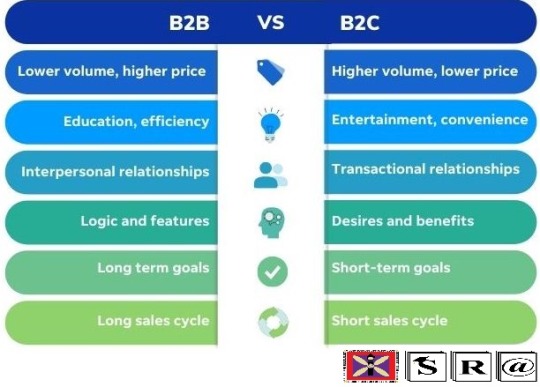
View On WordPress
0 notes
Text
Start E-commerce Business in India 2024
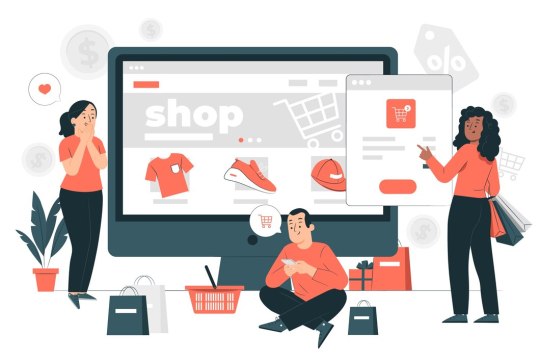
Aspects of the best in the field of Indian e-commerce, whether consumer or business-oriented, are essential to assess. 2024 is in full swing, and the e-commerce segment is as competitive as ever: it ranges from huge players competing to become market behemoths to ambitious startups ready to turn the retail market on its head.
In India, there are top and popular e-commerce marketplaces where sellers can sell their products and services to the larger customers base available on these channels.
Before starting the e-commerce business, sellers or entrepreneurs should be aware of below mentioned aspects important to start a online business on the basis of the type of e-commerce business they want to start.
Research Your E-commerce Business Idea: First thing to do a thorough research about your business idea, study about your competitors, cost analysis, profit analysis, average selling price of your niche products, etc in the market. These researches helps you to get deep knowledge about the business your are planning to start.
Target Audience: After doing the research about the business idea, sellers on companies need to look up for their target audience. Target audience means those people who can convert paid customers for business in future.
Choose Right Marketplace: In this step seller needs to decide which is the best platform to start a online e-commerce business. E-commerce business have four types: B2B, B2C, C2C, C2B therefore, on the basis of type of e-commerce business and target audience and on the basis of business registration process sellers needs to decide the right marketplace.
Whether you are the new seller, or the existing one, relaunching your e-commerce business, or need guidance to make your business successful then these aspects can help you.
#ecommerce#marketing#business#startup#sales#branding#buyers and sellers#ecommerce marketing#ecommerce business#ecommerce solutions#ecommerce website design#ecommerce store
2 notes
·
View notes
Text
Top 10 B2C Market Research Companies
Introduction
In the dynamic landscape of consumer behavior and market trends, businesses rely heavily on insightful market research to make informed decisions. For companies operating in the Business-to-Consumer (B2C) sector, understanding consumer preferences, purchasing patterns, and emerging trends is crucial for maintaining a competitive edge. In this digital era, where data reigns supreme, partnering with the right market research firm can make all the difference.
Why B2C Market Research Companies Matter
B2C market research companies specialize in gathering, analyzing, and interpreting data related to consumer behavior, preferences, and trends. Their comprehensive insights help businesses tailor their marketing strategies, product development, and customer experiences to meet the evolving demands of their target audience. By leveraging the services of reputable B2C market research companies, businesses can:
Gain Consumer Insights: Understand the needs, preferences, and pain points of their target consumers.
Identify Market Trends: Stay ahead of industry trends and anticipate shifts in consumer behavior.
Validate Business Strategies: Validate product ideas, marketing campaigns, and expansion plans through data-driven insights.
Enhance Customer Experience: Improve customer satisfaction by aligning products and services with consumer expectations.
Mitigate Risks: Identify potential risks and challenges in the market landscape before they impact the business.
Now, let's delve into the top 10 B2C market research companies renowned for their expertise, reliability, and innovative approaches:
1. Philomath Research
Philomath Research is a distinguished name in the realm of B2C market research, renowned for its innovative methodologies and actionable insights. With a focus on delivering customized research solutions to B2C clients, Philomath Research stands out for its commitment to excellence and deep industry expertise. Leveraging advanced analytics and cutting-edge technologies, Philomath Research empowers businesses to make informed decisions and drive sustainable growth in dynamic market environments.
2. Nielsen Holdings plc
Nielsen is a global leader in market research, known for its comprehensive data analytics solutions across various industries, including consumer goods, media, and retail. With a vast network of data resources and advanced analytics capabilities, Nielsen provides actionable insights into consumer behavior, media consumption, and market trends.
3. Ipsos
Ipsos is a multinational market research and consulting firm that offers a wide range of services tailored to B2C companies. From brand tracking and customer satisfaction surveys to product testing and market segmentation, Ipsos provides in-depth insights to drive business growth and innovation.
4. Kantar
Kantar is another prominent player in the market research industry, offering a diverse portfolio of services to B2C clients worldwide. With expertise in brand strategy, consumer insights, and retail analytics, Kantar helps businesses unlock growth opportunities and optimize their marketing efforts.
5. GfK
GfK is a trusted provider of market intelligence and consulting services, specializing in consumer and retail research. Through innovative data collection methods and advanced analytics, GfK helps B2C companies understand market dynamics, consumer behavior, and competitive landscapes.
6. The NPD Group
The NPD Group is a leading market research firm focused on tracking consumer trends and purchasing behavior across various industries, including retail, technology, and entertainment. With its robust data solutions and industry expertise, NPD delivers actionable insights to drive strategic decision-making for B2C clients.
7. Mintel
Mintel is renowned for its comprehensive market intelligence reports and consumer research services, catering to the needs of B2C companies worldwide. From trend analysis and competitive benchmarking to consumer surveys and product innovation insights, Mintel equips businesses with the knowledge to succeed in dynamic markets.
8. Euromonitor International
Euromonitor International specializes in global market research, providing strategic insights and data analysis to B2C companies operating in diverse sectors. With its extensive coverage of industries, countries, and consumer trends, Euromonitor helps businesses identify growth opportunities and make informed decisions.
9. Deloitte
Deloitte offers a wide range of consulting services, including market research and consumer analytics, to B2C clients seeking strategic guidance and actionable insights. With its deep industry knowledge and analytical capabilities, Deloitte helps businesses navigate complex market landscapes and drive growth.
10. Forrester Research
Forrester Research is a leading provider of market research and advisory services, focusing on technology, consumer trends, and business strategy. With its data-driven insights and strategic recommendations, Forrester empowers B2C companies to innovate and adapt to changing market dynamics effectively.
Conclusion
In the competitive landscape of B2C market research, Philomath Research stands as a beacon of excellence, offering tailored solutions and innovative approaches to meet the evolving needs of B2C clients. By partnering with reputable market research firms like Nielsen, Ipsos, and Kantar, businesses can access a wealth of insights to drive growth, innovation, and customer satisfaction in today's dynamic consumer-driven markets.
FAQs
1. What is the significance of B2C market research companies for businesses?
B2C market research companies play a crucial role in helping businesses understand consumer behavior, preferences, and trends. By providing actionable insights, these companies enable businesses to make informed decisions regarding product development, marketing strategies, and customer experiences, ultimately driving growth and profitability.
2. How do B2C market research companies gather data?
B2C market research companies utilize various methodologies to gather data, including surveys, focus groups, interviews, observation, and data analytics. They may also leverage advanced technologies such as artificial intelligence and machine learning to analyze large datasets and extract meaningful insights.
3. What types of services do B2C market research companies offer?
B2C market research companies offer a wide range of services tailored to the needs of businesses operating in the B2C sector. These services may include consumer surveys, market segmentation, product testing, brand tracking, competitive analysis, trend forecasting, and customer experience management, among others.
4. How do businesses benefit from partnering with B2C market research companies?
Businesses benefit from partnering with B2C market research companies by gaining access to valuable insights that inform strategic decision-making. These insights help businesses identify market opportunities, understand consumer preferences, validate business strategies, mitigate risks, and optimize their marketing efforts to drive growth and profitability.
5. What sets the top B2C market research companies apart from the rest?
The top B2C market research companies are distinguished by their deep industry expertise, innovative methodologies, comprehensive data analytics capabilities, and ability to deliver actionable insights that drive tangible business outcomes. They also possess a strong track record of success and a reputation for reliability and excellence in their field.
6. How can businesses choose the right B2C market research company for their needs?
Businesses can choose the right B2C market research company by considering factors such as the company's industry expertise, track record, service offerings, technological capabilities, client testimonials, and cost-effectiveness. It's essential to partner with a company that aligns with the specific needs and objectives of the business.
7. What are some common challenges businesses face in conducting B2C market research?
Some common challenges businesses face in conducting B2C market research include obtaining representative sample sizes, ensuring data accuracy and reliability, navigating regulatory and ethical considerations, interpreting complex data sets, and effectively integrating research findings into actionable strategies.
#B2C market research#b2b market research company#b2c market research company#b2c market research firm#B2C Market Research Companies#B2C Market Research Agency
0 notes
Text
Market Research Panels
Hyper-niche digital panels across a diverse and niche range of industry sectors and consumer demographics, across 6 continents under Panel Solutions, we drive research studies of all types, scales and complexities. Know more about the utilities of market research panels and our panel capabilities from Borderless Access.
0 notes
Text

Healthcare Research Panels in Delhi
Snware's in-house healthcare panel comprises experts from over 50 featured specialisations and subspecialties. Among our verified and profiled members are technicians, dieticians, pharmacists, lab managers, purchase managers, nurses, and social workers. Searching for medical professionals in the C-suite? Our robust panels of healthcare experts include C-suite executives from payer/MCO organisations, pharmaceutical companies, hospitals, and medical device companies. They also include senior executives, medical directors, and C-level professionals. With years of nurturing and developing inroads into various platforms, our Healthcare Panel has established a reputation as a top-notch panel of healthcare professionals that provides healthcare benefits and charitable contributions through a variety of community programmes. Our ability to connect and reach difficult-to-reach target audiences stems from our in-depth profiling of experts and illnesses.
For more info visit https://snwareresearch.com/healthcare-panels/
0 notes
Text
custom platform development company that provides goal-oriented technical advice to businesses for all the latest technologies. We build custom platforms for all kinds of market research players, whether the requirement is of a B2C application or of a B2B application.
Online research project management platform
custom market research services
customized development & consulting
2 notes
·
View notes
Text
The global gift card market continues to grow at an accelerated pace on the back of digital gift card offerings in 2023
Digitalization, tech-savvy population, and increasing trend of strategic alliances is driving the growth of the global gift card market in 2023. The growth rate is significantly higher in markets like the United States. According to a report from PayNXT360, the United States gift card market is expected to grow at a compound annual growth rate (CAGR) of 5.7% from 2023 to 2027. Based on the estimates, the industry will increase from US$185.4 billion in 2022 to reach US$247.9 billion by 2027.
#Gift card market size#B2C Ecommerce Industry size#gift card trend#BNPL market size#gift card research report#Asia pacific Social Commerce market#Growth of B2C Ecommerce Market#B2C Ecommerce Market Analysis#gift card market research#Industry Outlook Of B2C Ecommerce Market#Prepaid card market share#U.S. prepaid card market#Prepaid card market research#Digital Remittance Industry size#Market Research Report Embedded finance#Social Commerce trend & Analysis#Industry outlook on Embedded Finance#gift card innovation#Embedded finance Industry size#Global Prepaid card market size#Industry outlook on BNPL#Prepaid card report#Report on Embedded Finance#Market Research Report BNPL#Social Commerce market size#Global Social Commerce Industry#Social Commerce market research#Loyalty Market Share#Report on Loyalty Management Market#Loyalty Management Market Size
0 notes